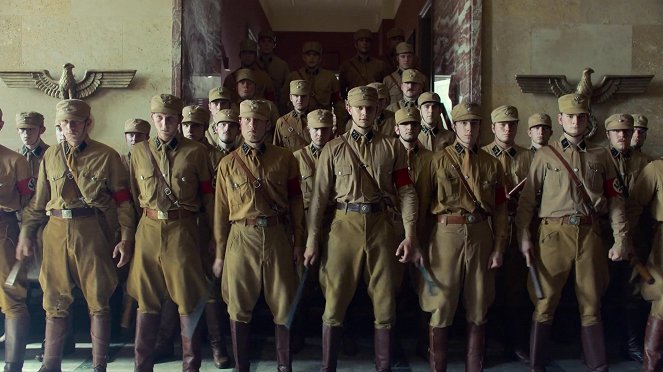Streaming (1)
Temporada(4) / Episodios(40)
Sinopsis(1)
Berlín, 1929. La capital alemana se sitúa como la gran metrópolis de la expresión y la libertad. La ciudad más moderna y viva de Europa es un hervidero de gente de toda condición política y clase social: en sus calles se mezclan comunistas, anarquistas, nazis, mafias e inmigrantes rusos, y en cada rincón proliferan artistas, bohemios, prostitutas, homosexuales, músicos, bailarinas de cabaret y travestidos. Pero tras su aparente clima de libertad y cambio, Berlín es una silenciosa olla a presión a punto de estallar. En mitad de esta tensa calma se encuentra Gereon Rath, un detective de la policía de Colonia que acaba de incorporarse a la unidad antivicio de Berlín, localizada en el monumental cuartel general de la policía, para investigar el caso de una red de cine pornográfico relacionado con la mafia rusa. En sus investigaciones Gereon conoce a Charlotte, una joven con la que empieza una relación clandestina y que busca mejorar las miserables condiciones de vida de su familia. (Divisa Home Video)
(más)Reseñas (5)
Volker Kutscher is something like “German James Ellroy". In the same way, he builds a (neo) noir crime movie as an unadorned image of the time through the seeming cacophony of postwar disillusionment, proletarian moods, cabaret debauchery, moral crimes, decadence, a mixture of ideologies, and much more. He combines seemingly disparate lines and look at them from bottom to elite; nevertheless, his ambiguous characters are always at the center of the action. The scope is not small and sometimes the case itself is forgotten. It´s quite tricky to adapt, but Babylon Berlin got the care it deserved. And so, the scale, the epicness, the design, the technical side (especially Tykwer's influence is obvious) and much more, all that remains is to nod appreciatively and admiringly. The cast is accurate, it's intoxicating, it doesn´t consider a viewer as a moron, who needs constant explanation of everything, here and there a scene is seen that you just can't get out of your mind (yes, the first is the hypnotic cabaret Zu Asche, Zu Staub. Nevertheless, all of this is reprehensible because of one aspect, which is hard to accept and it is not possible to get used to it completely even after several series. Although it takes place in Berlin, the fates of the two dozen characters are constantly intersecting. Unlike the original, however, this is not so cleverly done; it is quite fundamentally different from each other, only the points of contact are common, it is not so much an adaptation as rather generally inspired by the motives of original. In the series, this is not justified by "storyline" thanks to the carefully prepared foundation, but simply by chance over and over again. In the area of a few days, one and every actor (and not just the central ones) repeatedly “just by the way" (not) directly clashes with another. The paper rustles in a deafening way when seeing this. It's so excessive “lost style", overused (it's not once every few episodes, but almost scene by scene) that it would seem ridiculous and unbelievable even in a village where only fifty people live and everyone knows each other. Not to mention in the busy, elemental and crowded cosmopolitan metropolis. Grrr. This is also true of the second series, but there it is at least slightly not that frequently seen. | S1: 4/5 | S2: 4/5 |
()
In the spring of 1929, the Weimar Republic experienced a period of prosperity and stability - the last in its short existence. However, it was not for everyone and not forever. May Day in Berlin becomes a shocking bloody spectacle, and the carefree visitors of decadent cabaret performances certainly do not share the concerns of the inhabitants of the extensive impoverished neighborhoods. Nevertheless, Berlin is an exciting place to live during that era, where many thrilling human dramas and remarkable stories take place. Babylon Berlin combines a variety of elements that increase its attractiveness and are traditionally appreciated by viewers: ambiguous, constantly surprising characters, and a sophisticated script that cleverly intertwines several storylines and smartly works with multiple secrets. Slowly and gradually, you discover the motives and intentions of the actors in this intricate game. You will find passion, love, betrayal, crime, and hatred, as well as intrigues and conspiracies, high political games, and petty schemes. Babylon Berlin also has a very decent budget compared to other European productions. As a spectacle, it may not reach the grandeur of the most elaborate productions that overseas studios are capable of producing, but the portrayal of 1920s Berlin is convincing and attractive nonetheless. We were looking for a series that we could watch as a family, and in competition with the acclaimed Big Little Lies, Babylon Berlin emerged as the winner among all participants. Therefore, give the thin police investigator with troubled sleep and an unpleasant war past a chance, and follow the tracks of a train heading from Russia to Berlin, leaving behind corpses and shattered hopes. Overall impression: 90%.
()
According to Kutscher, Tykwer's Babylon Berlin is one of those rare works that appeal to both critics and the general viewer. The novels that follow the cases of the originally Cologne-based crime novelist Gereon Rath inspired this great return to the Weimar Republic, which has once again become interesting, which is great. In the original, the viewer can practice their German and Russian and experience something quite different again. The main characters are different and they're not clichés from the usual crime dramas. Gereon Rath stands between Cologne and Berlin, between the present and the trauma of war. Charlotte Ritter is an utterly perfect heroine who is about to rise from humiliating poverty... and both are surrounded by the full panoply of cops, monarchists, Trotskyists, communists, hookers and other denizens of that near-mythical city. Each individual experiences for himself and in his group the effects of war reparations, yet also the joys of modern times. The increased interest in this series is well deserved. The case has also been adapted as a comic and an audiobook, and if all this raises awareness of this historical era, it will only be a good thing. Meanwhile, the novels continue until 1937.
()
The Weimar Republic is a great setting for a crime series with a political backdrop. For this reason alone, I was very much looking forward to the show and I wasn’t disappointed. On the other hand, some of the creators' decisions managed to dampen my enthusiasm. I was satisfied, but not enough to give five stars. Out of the sixteen episodes, three were considerably weaker. Unfortunately, this included the finale, which crossed over to another genre with the action, which spoiled my overall impression. Season 1 was definitely better, I immensely enjoyed the contrast between the crisis-affected daytime Berlin and its nightlife decadence. I was equally pleased with the clashes of political views (the two Bolshevik factions alone would have been enough). Whatever my complaints, the fact is that I enjoyed the series and wasn't bored for a moment, so I was more or less satisfied. Oh, and by the way, I can't get the theme song "Zu Asche, zu staub" out of my head no matter how hard I try.
()
The series could easily have turned into an ordinary crime drama set in 1929 Berlin, but it wouldn't have featured the famous Tykwer-Klimek duo. I do not mean to question the merits of other creators, but few could have so gracefully presented the political situation of the Weimar Republic, guided the nightlife of Berlin's bohemians with spectacular musical numbers, and solved over a dozen conspiracies from monarchists to communists. And with a period soundtrack that proves that even music in the spirit of the 1920s can be "cool", it's really easy. If it weren't for the somewhat rushed finale, it would have been flawless, as the main story is wrapped up with several excellent twists and turns, but the subplots of the secondary characters are a bit too contrived for that. Otherwise, great.
()

